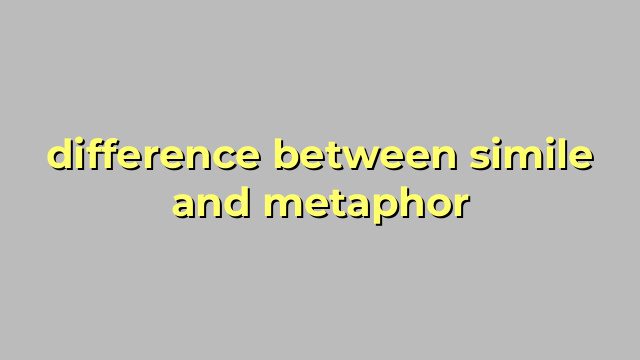Difference Between Simile and Metaphor
Simile
Simile is a literary device used to compare two things, often using the words “like” or “as.” It can be used to make a comparison between two unrelated objects, situations, or ideas. Similes help to create imagery and enhance the reader’s understanding of a concept or thing by comparing it to something that is more familiar or easily understood.
Here is an example of a simile: “Her hair was as black as a raven’s wing.” In this simile, the woman’s hair is being compared to a raven’s wing, emphasizing how dark and shiny it is.
Metaphor
Metaphor is also a literary device used to compare two things, but it doesn’t use “like” or “as.” Instead, it directly equates the two things, suggesting that they are essentially the same or share similar qualities. Metaphors can be used to create a deeper understanding of a concept or thing, by suggesting a characteristic or trait that the reader may not have considered before.
Here is an example of a metaphor: “Life is a journey.” In this metaphor, life is being directly compared to a journey, suggesting that both have twists and turns, ups and downs, and potential for discovery.
The Difference
While similes and metaphors are both used to create comparisons, the key difference lies in how they make those comparisons. Similes use “like” or “as” to create a comparison, while metaphors directly equate one thing to another.
Similes tend to create a more tangible, concrete comparison as they introduce a specific object or idea for comparison. In contrast, metaphors can create a more abstract comparison, as they don’t always provide a clear object or idea for comparison.
Overall, both similes and metaphors are important literary devices that can help enhance a reader’s understanding of a text. Understanding the difference between the two can also help writers to choose the right one that will best express their intended meaning.
Table difference between simile and metaphor
| Simile | Metaphor | |
|---|---|---|
| Definition | A figure of speech that makes a comparison between two unlike things, using the words “like” or “as”. | A figure of speech that makes a comparison between two unlike things, without using the words “like” or “as”. |
| Example | She sings like an angel. | She is an angel when she sings. |
| Use of comparison | Explicit | Implicit |
| Scope of comparison | Limited | Extended |
| Effect on reader | Highlighting a specific similarity | Creating a deeper meaning or association |
